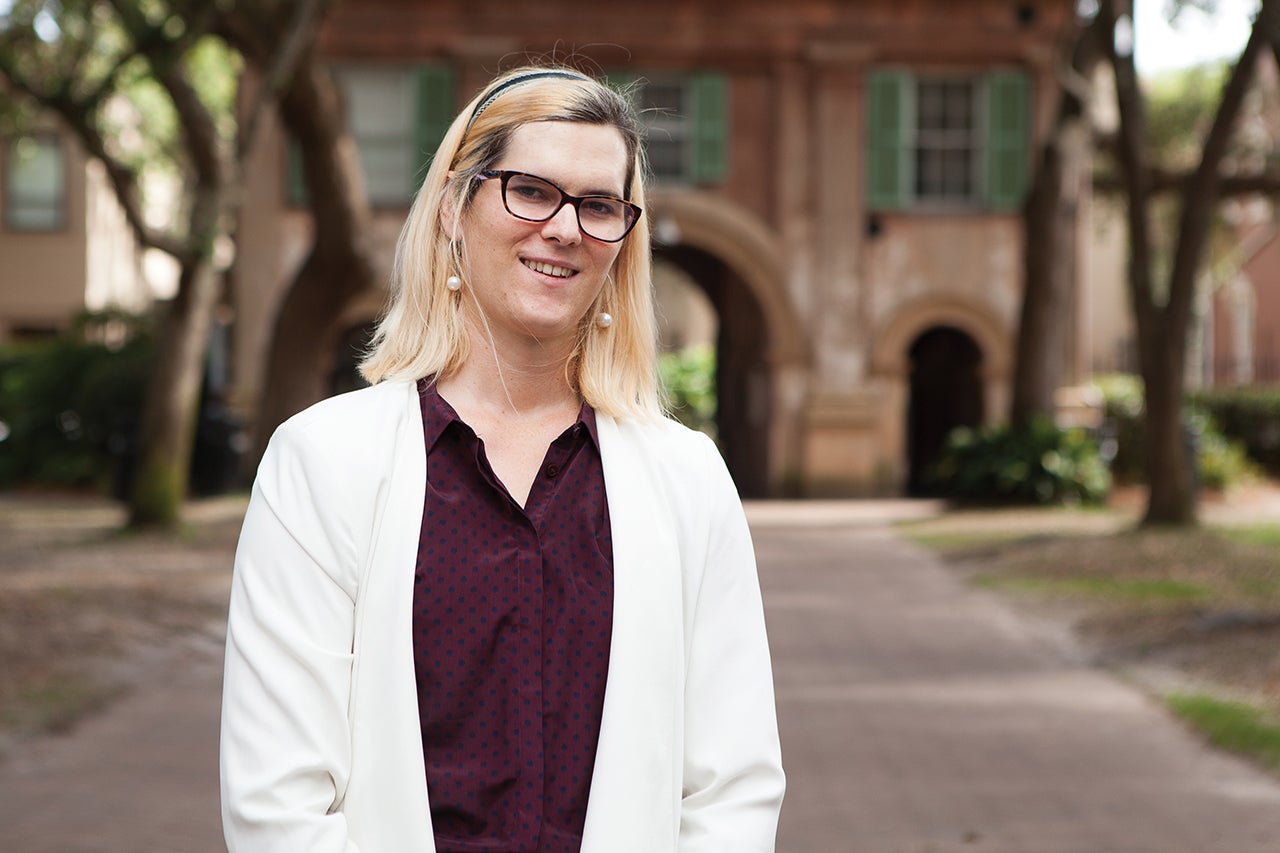Rachel McKinnon’s new class, Introduction to Trans Studies, tends to go off topic. A lot. And that’s a good thing.
Amid the fluorescent lights of a classroom in Maybank Hall in late August, the assistant philosophy professor’s lecture highlighting introductory information on trans studies quickly veered to conversations ranging from politically charged topics to the best language to use when talking about minoritized and marginalized communities. Before class began that day, McKinnon and her students had already discussed how and why she had chosen to respond to recent Twitter attacks from TERFs (Trans-Exclusionary Radical Feminists) over her tweets about transgender issues.
And that was just the third class of the fall semester.
“The lectures go where students want them to go,” says McKinnon, adding, “I work hard to create that sort of atmosphere.”

Rachel McKinnon began teaching her Intro to Trans Studies course in the fall of 2017. (Photos by Reese Moore)
McKinnon’s approach undoubtedly offers students a memorable introduction to the historical and contemporary issues in the emerging field of trans studies. But McKinnon – a transgender woman who has been published extensively on transgender issues and runs a “Trans 101” YouTube video series – says she hopes the class gives students an appreciation for how complicated trans studies are, and a skill set to talk productively about identity and intersectionality at large.
“I take the goal of a liberal arts education really seriously,” she says. “We’re here to educate the whole citizen. Not just academically, but a citizen who inhabits a social world.”
And while McKinnon’s teaching style allows for students to touch on topics at mind, there are specific issues the course broaches. Students break down what it means to be transgender, including the relationship between sex and gender. Just three classes in and McKinnon’s course had already explored – in depth – the language that should be used to talk about trans lives. In fact, language is a big topic of focus throughout the class.
“One goal of this course is to equip students with better language and skills to communicate about sensitive, difficult, fraught topics,” she says.
The course also invariably covers current events, from activism efforts to recent actions by local, state and federal governments on trans issues and the effects they’ve had on trans communities across America.
In fact, McKinnon says there’s so much to talk about that the only problem she had when building the syllabus was trying to fit in every topic she wanted to cover.
When Courtlin Lee met McKinnon at an event last year, he was immediately drawn in by the professor’s emotional honesty and openness. When the elementary education major heard about McKinnon’s new class, he jumped at the chance to take it.
“The issues we have looked at in this class are some of the problems that go on in today’s society,” says the sophomore from Anderson, S.C., adding that he’s learned a lot of terminology with which he wasn’t familiar. “The class is definitely an eye opener, and you have to pay close attention or you might miss something.”
It’s important to realize, says McKinnon, that the issues discussed in the course aren’t political in nature: Transgender studies is a legitimate academic discipline. At least four programs have been created at colleges across the U.S. since the University of Arizona offered the first trans studies degree in 2015. And, there is intelligent discourse on the topic everywhere, from academic journals to YouTube channels like McKinnon’s and those of other scholars.
“This isn’t forcing political opinions on people,” she says. “This is something that I and others publish on. It’s the work that I do.”
In the end, McKinnon says the introduction course is about promoting trans literacy and giving cisgender and trans students a place to learn about the emerging field.
“Students get to learn from one another a lot, which I love,” she says.
And if they learn something more when the class goes off topic, all the better.




